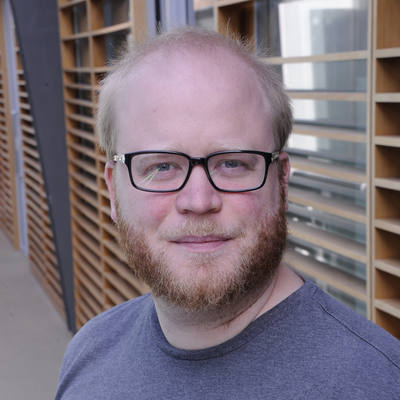Martin Pollard, Technical Innovator, talks about his career path at the Institute

From a Computer Science background, Martin is a Technical Innovator within the ICT Scientific team and is also undertaking a PhD part-time. Here he shares what he has learnt about enthusiasm for projects, the importance of the creation of long-term career paths for Techs at Sanger and discovering what’s possible with cutting edge technologies.
What has helped me personally in my career so far is curiosity and talking to people – especially people who have been around for a long time and experienced a lot themselves. Few problems we come across are entirely novel and by just spending a little time listening to others gives an edge. Something else that has contributed to my development is realising how much detail matters when it comes to data. When I start a project I try to learn about the data from the bottom to the top. I talk to the people in the labs and pay particular attention to the aspects that others are doing.
As someone with dyspraxia I have to continuously work on self-organisation skills as it’s something that doesn’t come naturally. It’s always going to be an uphill battle but one that, with perseverance, I am winning.
What I enjoy most about my role is getting to explore what is possible with computing, finding technologies that can aid the Institute’s work with our ever-growing data and computational needs. Our data has always been huge and only continues to get bigger – only by anticipating our future needs will we be able to stay on top of it.
The Technician Commitment has helped me have an opportunity to influence the creation of a longer-term career path for Techs staff at Sanger. This is a long time ambition of mine as I believe everyone needs the chance to shine and institutional memory is important – especially in knowledge based fields like ours. Also the fact that people value my work here and want me to stay around is really important to me.
The advice I’d give to someone starting out in their career would be to make sure that any long-term project that you undertake is something you are passionate and enthusiastic about. Every project has its peaks and trough and it is that enthusiasm that will keep you going and get you through to the end goal.
What led me to my current career path was listening to lot of the MIT Open Courseware Introduction to Genetics lectures on iTunes by Eric Lander and Bob Weinberg – it was an amazingly well taught course and inspired my curiosity from the outset. One fateful evening I decided to apply for UCL’s Masters in Genetics of Human Disease course. Being a Computer Science graduate I fully expected my application to end up in the recycling bin and was surprised to find myself interviewing and then on the course. After I’d finished, not knowing where to go, I had reverted to IT systems work when I got a call from Joshua Randall asking me to interview for a newly formed team called HGI at Sanger. Since then I have worked in several teams across the Institute including a Faculty team, NPG and now in my current role in IT. I’m also working on a part time PhD with Peter Campbell and needless to say my days are full!
It is an honour to be part of the Sanger legacy of scientific discovery and leave the world in a better place than we found it. Projects like DDD, COG-UK and our work in Cancer are examples of how what Sanger does is of real practical help to real people, not just abstract ideas. My only regret is not getting into science immediately after my undergraduate degree, I missed out on a lot of the breakthroughs!
This article was written as a part of the Technician Commitment case studies.